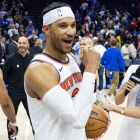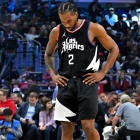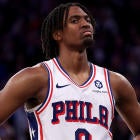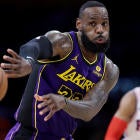The Boston Celtics earned a trip to the conference finals with a 115-105 victory over the Washington Wizards on Monday, sending John Wall and Bradley Beal home to contemplate what's next and perhaps beg for a better bench. While the Wizards wallow in what could have been, the Celtics have only a couple of days to prepare for the rested and relaxed Cleveland Cavaliers, who haven't played since putting the Toronto Raptors out of their misery last Sunday.
Ahead of Wednesday's Game 1 at TD Garden, here are five questions about the matchup between the Eastern Conference's top seed and the team everybody expects to make it to the NBA Finals:
1. Will Isaiah do his thing?
Isaiah Thomas is at his best when he's carving up defenses and worming his way toward the basket. He's sort of like a tiny version of James Harden, dancing on the perimeter and comfortable pulling up for 3s if you give him space. Boston has empowered him to take over its offense this season, and he has few weaknesses on that end of the floor. Even if you surrender the midrange, he can punish you.
Like any Celtics opponent, the Cavaliers will likely show Thomas multiple pick-and-roll coverages and use different primary defenders throughout each game. The key thing to watch, though, is just how much help they send his way. The Wizards series could have been good preparation for Thomas in terms of handling pressure defense, but some thought the Milwaukee Bucks were theoretically an ideal test DeMar DeRozan and Kyle Lowry before the Raptors faced the defending champs. That didn't turn out to matter.
The biggest compliment I can give Cleveland's defense is that it has been excellent at executing its game plan. My best guess is that its game plan will be limiting Thomas' playmaking. Thomas will approach this series with an attacking mentality, but if the Cavs load up on him, then he'll have to get rid of the ball and trust his teammates to punish them.
2. Can Boston do anything about Cleveland's shooting?
The Cavs scored 183 points on 3-pointers in the semifinals. Their opponents, the Raptors, scored 81. That is a 102-point differential, and even if the other team is dominating the paint, it is an almost impossible number to overcome. Based on how many 3s the Celtics usually attempt, that margin is unlikely to be as extreme. It could, still, however, be the most important factor.
Cleveland has weaknesses, mostly when it comes to defense. If Boston is disciplined offensively, it will be able to get good looks. The Cavs' shooting, though, can make their deficiencies seem inconsequential. There is simply no good answer to the problem of LeBron James surrounded by shooters, and Cleveland's front office has acquired some of the very best shooters on the planet for this reason.
The scariest part: In addition to Kyle Korver, Channing Frye, J.R. Smith and Kevin Love shooting as well as you'd expect, James himself has made 46.8 percent of his 3s in the playoffs. Boston has a team full of quick and athletic perimeter players, and they're all going to have their work cut out for them when trying to help on drives and challenge shooters. It would also help if their second unit, led by Game 7 heroes Kelly Olynyk and Marcus Smart, made the Cavs work defensively.
3. Will the Cavs crash the glass and own the paint?
Rebounding has been Boston's biggest flaw all season, so facing a team that starts Love and Tristan Thompson next to James is a bit of a problem. Love averaged 23.7 points and 13 rebounds in three games against the Celtics; Thompson averaged 11.7 points and 12.0 rebounds. More importantly, Cleveland rebounded better in the regular season against the Celtics than it did against any other team in the league -- it grabbed 54.1 percent of available rebounds, including 27.1 percent of its own misses, per NBA.com.
This is the kind of series where Boston would like to have extra possessions, but that seems extremely unlikely, even if coach Brad Stevens sticks with Amir Johnson next to Al Horford in the starting lineup. Sometimes the Celtics go small and essentially concedes that it will lose the rebounding battle, but …
4. Can Boston get away with using small lineups?
Thompson has quietly been one of the best big men in the playoffs. His defense on the inside and the perimeter is absolutely essential for Cleveland, and he has an insane 18.9 percent offensive rebounding rate in the playoffs, better than anybody other than Robin Lopez.
Lopez was able to dominate the glass largely because he played all his games against the small Celtics. Thompson doesn't have the same size as Lopez, but he and Love present the same problems.
The other issues: If Boston downsizes, then it might have to double-team Love in the post. Also, If it forces the Cavs to go small, that's not necessarily a win. Cleveland can use Love or even James at center, with athleticism and shooting at every other position.
5. Is Horford's recent play sustainable?
Few players have had a better all-around postseason than Horford. He ties the Celtics together on both ends, and his chemistry with Thomas couldn't be much better. They wouldn't have been able to get past the Wizards without his passing, defense and shooting. He shot a ridiculous 67.6 percent and 60.9 percent from 3-point range in the semifinals.
It would be unfair to expect Horford to have similar production against the Cavs, but Boston might need something similar in order to have a chance. He needs to keep them honest against Thomas, and he's going to have to be everywhere defensively, too.






















